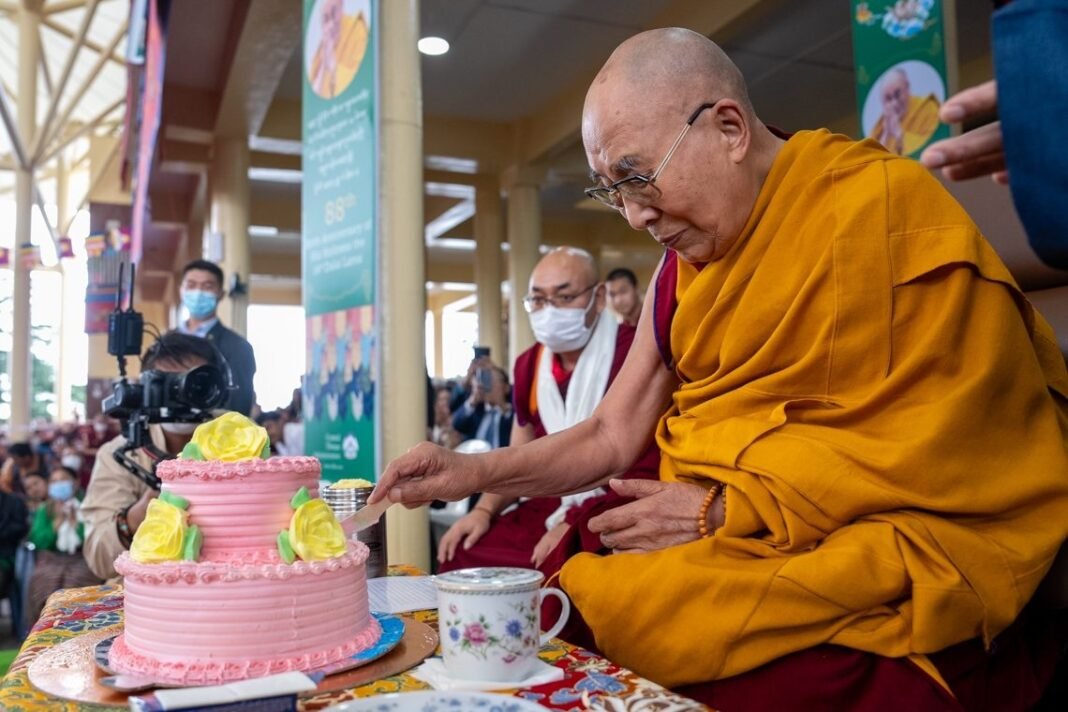The 14th Dalai Lama, spiritual leader of Tibetan Buddhists and global advocate for peace, turned 90 this week, marking the milestone with celebrations, messages of admiration from world leaders, and a significant statement about the future of Tibetan Buddhism—one that reignited tensions with China.
The Nobel Peace Prize laureate used the occasion to confirm that the institution of the Dalai Lama will continue after his death through reincarnation. In a video message released on Wednesday, His Holiness declared that his charitable foundation, the Gaden Phodrang Trust, will have the sole authority to recognize his successor. This announcement ends years of speculation over whether he might be the last of his lineage.
“No one else has any such authority to interfere in this matter,” the Dalai Lama said, directly addressing attempts by the Chinese government to assert control over Tibetan religious leadership.
A Legacy Rooted in Resistance and Compassion
Born as Lhamo Dhondup in 1935 in the remote Tibetan village of Taktser, the Dalai Lama was identified as the reincarnation of the 13th Dalai Lama at the age of two. Formally recognized in 1939 as the 14th Dalai Lama, Tenzin Gyatso has spent much of his life in exile after fleeing Tibet in 1959 following a failed uprising against Chinese rule.
Now based in Dharamshala, India, he has spent decades advocating for a peaceful “Middle Way” approach that seeks genuine autonomy for Tibet within China, while maintaining religious and cultural rights for Tibetans.
China Rejects Reincarnation Claim, Asserts Control
China’s foreign ministry swiftly responded to the Dalai Lama’s statement, reiterating that any reincarnation of the Dalai Lama must be “approved by the central government.” This echoes Beijing’s position in 1995, when the Dalai Lama’s chosen Panchen Lama, Gedhun Choekyi Nyima—another high-ranking spiritual figure—was detained by Chinese authorities just days after being identified. He has not been seen since.
In response, Beijing appointed its own Panchen Lama, Gyancain Norbu, who is widely seen by Tibetans as a state-sponsored replacement and rejected by the Central Tibetan Administration in exile.
Celebrations in India and Around the Globe
Thousands of devotees, dignitaries, and celebrities gathered in Dharamshala to celebrate the Dalai Lama’s birthday, including Indian ministers and Hollywood actor Richard Gere, a longtime supporter of the Tibetan cause. Cultural performances and religious ceremonies were held across Tibetan communities worldwide.
In a birthday message on his website, the Dalai Lama said he remains “just a simple Buddhist monk” and reaffirmed his commitment to promoting compassion, human values, and interfaith harmony.
International Support for Religious Freedom in Tibet
Leaders from around the world sent messages of goodwill, including Indian Prime Minister Narendra Modi and U.S. Secretary of State Marco Rubio. Modi praised the Dalai Lama as “an enduring symbol of love, compassion, patience, and moral discipline,” while Rubio emphasized the U.S. commitment to defending the religious freedom and cultural heritage of Tibetans.
“The United States supports the right of Tibetan Buddhists to choose and venerate their religious leaders without interference,” Rubio said.
As the Dalai Lama begins his tenth decade, his message remains unwavering: the spirit of Tibet will live on, even in the face of political opposition.








